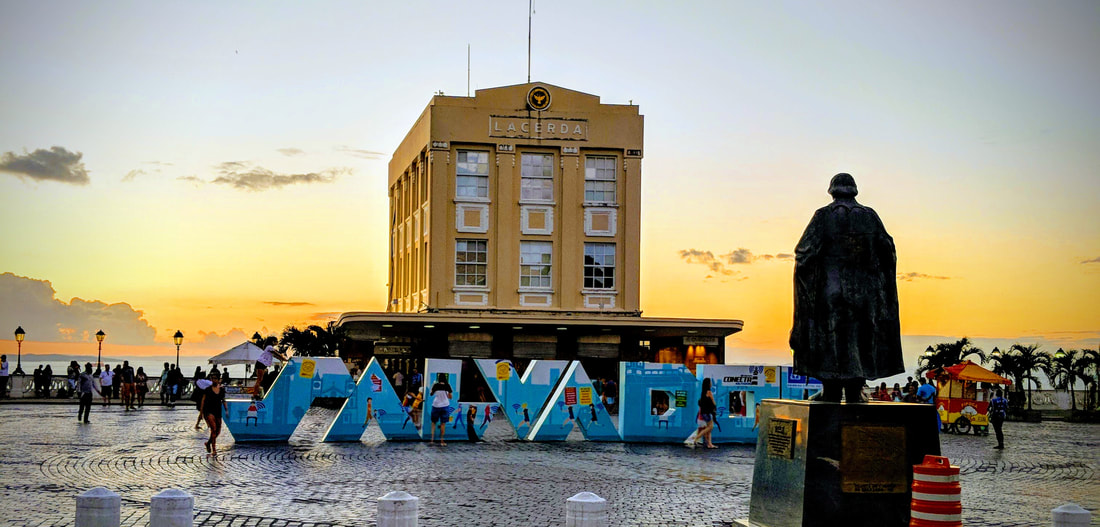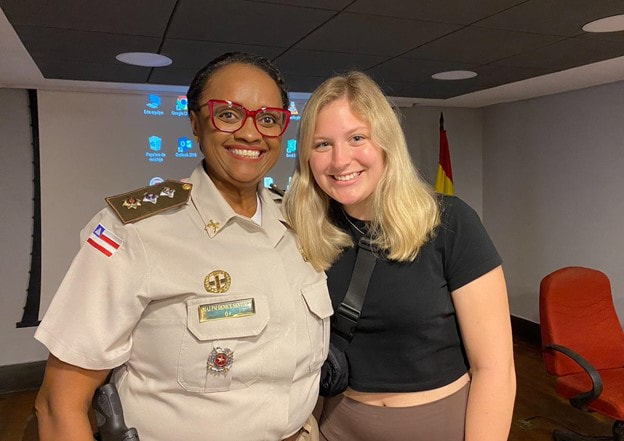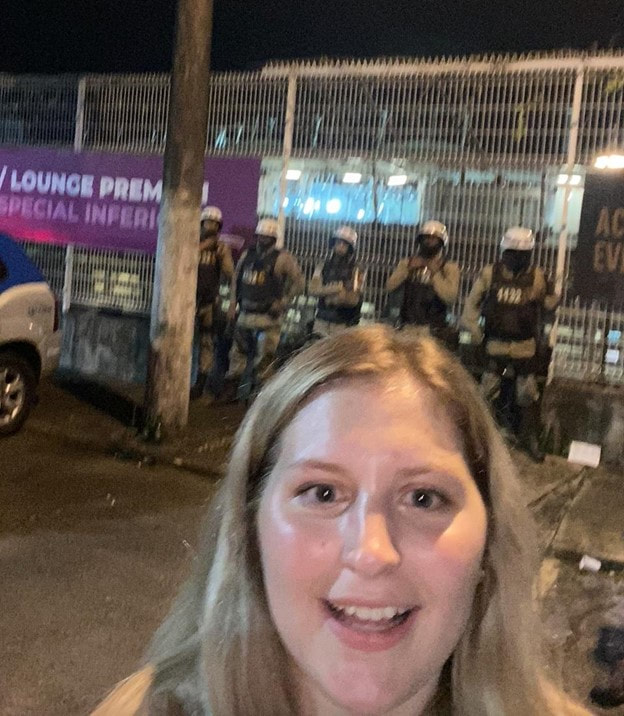|
By Clair Moonen Just when I thought I was starting to be a Brazilian local, I was once again humbled by my Uber driver who called me loira burra Americana and I responded with “obrigada”. As my trip comes to a triste close, I have experienced my favorite events and workshops. Throughout the trip I got out of my comfort zone, I played basketball with kids, ziplined, ate questionable foods, and had difficult cultural discussions with my host sister. Something that was not so sunshine, and rainbows were that with every great or cheap experience I had, it came at a cost. I learned of a new feeling of helplessness every time I only paid a few USD for an item knowing it was so available and cheap at the expense of the vendor. Visiting islands where you stay for a few nights in a luxury hotel as the man who sold you a bracelet for $3 USD relies on tourism to feed his family is not a good feeling. Pedro taught us to embrace the uncomfortable, analyze it, process it, and proceed accordingly. In my pre-departure research, I focused on elections and representation. This has been a reoccurring interest in my trip here as I try to interconnect themes of the said proposal because it is what I have the most background on. Women are the largest majority of voters in Bahia and yet we don’t see women in positions of power (Santiago, ICR Lecture May 27, 2022). One of the themes that have been most prominent to me has been taking up space. Whether creating opportunities for one group of people or removing another to create more equal space. While this concept isn’t new to me in regard to gender inequality, I didn’t know how true this theory would be reoccurring in my everyday life here. A prime example of taking up space is the efforts implemented to amplify women’s voices and guarantee their rights and protection. The law Lei Maria da Penha was created in 2006 to combat domestic violence and give women a support system. Taking up space by being present, saying loud and clear “I’m here” and that there are countless people and resources behind these women. Federal Deputy Candidate and founder of Ronda Maria da Penha in Salvador, Major Denise Santiago, gave us a lecture on the challenges of being a woman in Brazil. As a general rule of thumb, where there are traditionally male-dominated spaces, there become issues targeting women. “The concept of femicide was identified as the murder of women due to their being women, a crime defined by Diana Russel1 as a type of sexual terrorism, a social mechanism for keeping women under control, in a public masculine manifestation of power” (Meneghel et. al, 2017). Violence against women is a problem that Major Santiago believe needs to be eliminated by women as we are the only ones who know the struggle. She believes to accomplish this education is a necessary vessel. This was instilled in us during our primary and secondary school talks where we learned how women are left out of STEM and male-dominated fields even though they attend school longer. I admire how Major Santiago enforces a feminist movement. Feminism, “can be seen as a result of many factors: changes in women’s position in Brazilian society, cumulative action of feminist movements and organizations in the country, the growth of feminist values in international media, the role of the internet in young people sociability” (Biroli, 2016). I think Major Santiago is part of and a catalyst of this change. As previously mentioned, the opportunity isn’t equitable. Women between 25 and 44 years old finish high school more than me- 6% more and yet with more schooling ear less than men (Santiago, ICR Lecture May 27, 2022). So statistically, women should be the majority in these spaces yet are minimized to the point that in Salvador the police force has been around 197 years with only 32 years with women in uniform. Major Santiago has climbed to the highest rank a woman can be in the police force and is campaigning to keep pushing the status quo. Elections are all about resources and financials and she is building an army of her own resources- women. By running for office, Major Santiago demonstrates taking up space for the sake of those who come after her. Over the 7 years, 4,000 women were protected by Ronda Maria da Penha and none of them experienced it again. A group of people that take up space that isn’t necessarily good are the police. When we went to my favorite event, the Bahia futebol game, I was in disbelief that they had riot police at every corner. As a Caucasian female, I have not been subject to or had fear of, police violence. If anything, as a woman I feel better with that presence because of harassment or gender violence. It seemed unnecessary and almost performatively intimidating to see the police head to toe in gear and holding giant guns. I knew I wasn’t their target audience. When Major Santiago spoke to us, she mentioned that police as so abundant in futebol stadiums. These numbers were because research showed after soccer matches violence increased by 27% (which is only known because 911 (190) calls increased- not reporting) depending on the outcome of the game (Santiago, ICR Lecture May 27, 2022). I have learned how thin the line is between negative and positive police presence. I don’t blame women for sitting closer to Ronda Maria da Penha in stadiums just as I don’t blame people of color for being afraid of the same situation. In Brazil, the most disturbing criminal activity is the violence perpetrated by these police (French, 2013). The police occupying urban and public spaces creating violence and safety should be at the top of politicians’ agendas and campaigns. Yet politicians and government officials, echoed by the media, distance themselves powerfully from police behavior (French, 2013). Understanding the double-edged sword that policing is I think is crucial to being a good human being. Biroli, Flávia Political violence against women in Brazil: expressions and definitions. Revista Direito e Práxis [en linea]. 2016, 7(15), 557-589[fecha de Consulta 29 de Mayo de 2022]. ISSN: . Disponible en: https://www.redalyc.org/articulo.oa?id=350947688018
French, Jan Hoffman. “Rethinking Police Violence in Brazil: Unmasking the Public Secret of Race.” Latin American Politics and Society 55, no. 4 (2013): 161–81. http://www.jstor.org/stable/43286490. Meneghel, Stela Nazareth, Bruna Alexandra Rosa, Roger Flores Ceccon, Vania Naomi Hirakata, and Ian Meneghel Danilevicz. “Feminicídios: Estudo Em Capitais e Municípios Brasileiros De Grande Porte Populacional.” Ciência & Saúde Coletiva 22, no. 9 (2017): 2963–70. https://doi.org/10.1590/1413-81232017229.22732015. Santiago, Denise ICR Lecture May 27, 2022
0 Comments
Leave a Reply. |
Archives
June 2024
Categories
All
|



 RSS Feed
RSS Feed
